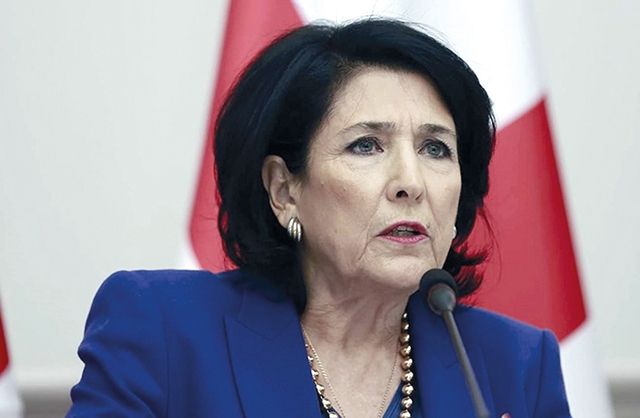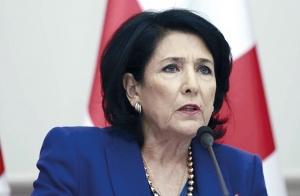Georgian President Criticized for Accepting Possible Visit of Russian Delegation
The Georgian opposition and non-governmental sector assessed the statement of President Salome Zurabishvili as “incompetent,” “shameful” and “totally unacceptable” when she suggested she would support a possible Tbilisi visit from a Russian delegation.
The controversy started on Wednesday after the President delivered a speech at the Parliamentary Assembly of the Council of Europe (PACE), saying despite the Law on Occupied Territories of Georgia, her country will host the Russian Federation delegation at the CoE Ministerial to be held in Tbilisi in May 2020.
The President said during her response (and not during her speech), “We are a state that respects our own international obligations and will accept the Parliamentary Assembly because we respect the regulations and principles of the organization.” It was noted that this isn’t support for the Russian delegation’s visit, it is support for Georgia's following its international obligations.
The President’s comments were harshly criticized by the opposition. Gigi Ugulava, one of the leaders of the European Georgia party, said that Zurabishvili has “become a traitor to her own country” and that the visit of the Russian delegation, including the Foreign Minister Sergey Lavrov, will have a very bad impact on Georgia. He added that if the Russian delegation enters Georgia, it will be followed by large-scale protests countrywide.
“We cannot block the borders and prevent the Russian delegation from making a visit, but everyone, including the Russians themselves, should know that in Georgia they will only get an aggressive and unfriendly welcome,” he said.
Member of the United National Movement Roman Gotsiridze claims that the Georgian President’s statement was “irresponsible.” He believes that if a Russian delegation does visit, there will be a massive public outcry which will cause even more of a stir than last summer, when a Russian delegation came to attend a session of the Inter-Parliamentary Assembly on Orthodoxy in June. The visit was followed by large-scale protests which were ultimately dispersed by riot police with the use of tear gas, rubber bullets and water cannon. 240 individuals, including 32 journalists and 80 law enforcers, were injured during the clashes.
“Granting permission for Sergei Lavrov to come will be a reaffirmation of the Georgian authorities' obedience to Russia and an insult to the souls of dead Georgian warriors who were protecting their country in the 2008 Russia-Georgia war,” Gotsiridze stated.
NGOs released a joint statement which reads that making statements in favor of the aggressor country’s delegation are “alarming and contradictory to the state’s national interests.”
The organizations explain that the Law of Georgia on Occupied Territories strictly defines that foreign citizens are allowed to enter the occupied territories only through Georgia, adding the members of the Russian delegation, and Lavrov himself, have reportedly violated this law many times.
“The President's statement contradicts the principle of a rule of law. The idea of a legal state is useless if the state power is not exercised within the framework clearly defined by the law. Disregard of the legislation by a high-rank official serves as a message to both the international and Georgian society that the law is a formality and the officials themselves decide when it can be violated,” the statement reads.
Expert Nika Chitadze says that given the fact that Georgia holds the Council of Europe's presidency at this stage, Zurabishvili expressed her readiness to receive the Russian delegation within this format, but he agreed it raised a lot of questions because Russia recognizes Georgia’s occupied Abkhazia and South Ossetia as independent states.
“I assess the President’s statements negatively. It is a shame that she made such irresponsible comments regarding such a sensitive topic,” the expert said.
Former President of Georgia Giorgi Margvelashvili noted that Georgia is to host the event as a CoE chair country and not as an individual state, so in this case preventing the Russian delegation entering Georgia might negatively affect the country’s image on the international arena.
“This is an extremely complicated topic...Not allowing Lavrov to enter Georgia can anger our European partners, who protect us from Lavrov, and those who reinforce our non-recognition policy,” he said. Although he said he recognized that it is a matter of dignity for Georgia not to let the occupant country’s representatives in, he underlined that it would ultimately endanger Georgia’s image not to do so.
The government’s position on the topic has yet to be clarified. However, Georgian Prime Minister Giorgi Gakharia said that such decisions are to be made in accordance with Georgian legislation.
"No-one can override the Georgian legislation. Georgia is the President of the Council of Europe, and unfortunately, it is a fact that Russia has regained its membership of the Council of Europe. No-one will be able to violate the Georgian legislation, the time will come and everything will be done in accordance with that legislation,” the PM stated.
Georgia will host the 130th meeting of the Committee of Ministers of the Council of Europe on May 14-15. It is not yet known whether Russian Foreign Minister Sergey Lavrov plans to come to Georgia to attend the event and what the composition of the Russian delegation will be. According to the Law of Georgia on Occupied Territories, foreign citizens are allowed to enter the occupied territories only from Zugdidi municipality to Abkhazia and Gori municipality to Tskhinvali region. Accordingly, members of the Russian delegation, who visited breakaway Abkhazia and South Ossetia by violating this rule, are subject to the Georgian Criminal Code if they come to Tbilisi in May.
By Tea Mariamidze
Image source: publica.ge












